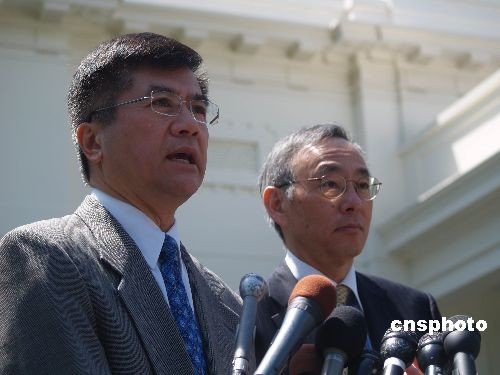A stronger Sino-US cooperation mechanism on environment protection may be expected during the ongoing visit of top energy and commerce department officials from the US, and this would offer more opportunities for green businesses in both countries, experts and industry analysts told China Daily yesterday.
 |
| File photo: US Commerce Secretary Gary Locke (L)?and Energy Secretary Steven Chu (R) |
Energy use and development were among the greatest of challenges facing all countries, and it was especially appropriate to establish a framework that would be sustainable in future, said Bob Poole, vice-president of?China Operations, US-China Business Council.
"We are happy they are visiting China, which shows that the Obama administration is viewing strong cooperation as a priority," said John Watkins, chairman of the American Chamber of Commerce China.
"We hope the visit will help us members find new opportunities in China, especially in the clean energy sector," said Watkins.
However, some analysts said there were worries about trade friction. For instance, carbon tariff was a type of trade protectionism, and ran counter to the rules of the WTO, said Song Hong, senior professor at the Chinese Academy of Social Sciences.
US Commerce Secretary Gary Locke and Energy Secretary Steven Chu arrived in Beijing yesterday. They were Washington's fifth and sixth officials to visit China to discuss climate change issues after US President Barack Obama took office six months ago.
Their three-day stay is expected to push forward energy cooperation between the US and China, the world's two largest emitters.
Four other major US delegations, led respectively by Secretary of State Hillary Clinton, Obama's Special Envoy on Climate Change Todd Stern, House Speaker Nancy Pelosi and Senator John Kerry, had arrived in China previously to discuss, among other things, issues related to energy and the environment.
While arguing that such visits offered both countries a chance to achieve something "concrete" in the climate arena, Chinese experts were cautious about how Beijing should respond to Washington's intense efforts during these high-level visits.
"It is hoped that both sides would make some declarations and in-principle commitment on joint research and development of clean energy," Qi Ye, an expert on climate change at Tsinghua University, said.
Kang Xiao, a researcher on climate change at the Renmin University of China, said Beijing should stick to its principles when cooperating with Washington, even though the visit offered a chance to avail of better technologies.
"We should be concerned about our national interest first," he said.
Qi said it was necessary to make clear that China was still a developing country.
"It will be impossible for China to make any significant changes on its basic stance (released in late May by the government) at the Copenhagen Conference," Qi pointed out.
China was the first developing country to launch a national plan for coping with climate change, Qi said.
(China Daily July 15, 2009)